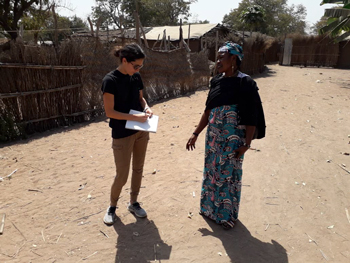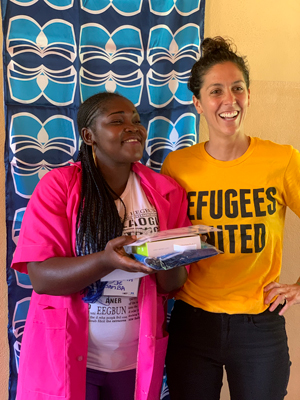Q&A with Sara-Christine Dallain: Collaboration and creativity
 Sara-Christine Dallain received her bachelor of arts degree in political science from the University of Hawai‘i at Mānoa. She is now the executive director of the Fund for Refugee Initiatives, a nonprofit organization that supports refugee initiatives and leadership through grants and resources.
Sara-Christine Dallain received her bachelor of arts degree in political science from the University of Hawai‘i at Mānoa. She is now the executive director of the Fund for Refugee Initiatives, a nonprofit organization that supports refugee initiatives and leadership through grants and resources.
We asked Sara-Christine a few questions about her time at UH, how she came to be doing what she’s doing today and what she loves most about her work.
Tell us a little about yourself. Where are you from and what are you doing now?
I was born in Quebec, Canada. I moved to the U.S.—to the Seattle area—when I was six years old. At the age of 14, our family moved to Santa Barbara, California, where I remained until attending the University of Hawai‘i at Mānoa. I'm now living in Venice Beach, working from home, and leading a nonprofit organization called the Fund for Refugee Initiatives as Executive Director.
What's one of your fondest memories of your time at UH?
Taking a couple of courses in Hawaiian Studies and, as a result, volunteering with a local organization and working in the taro wet paddies. I distinctly remember being barefoot and getting our feet, legs, and hands dirty (which I loved) and learning about traditional Hawaiian agricultural methods. As a newcomer to Hawai‘i, those courses and that experience were essential to fully experience my time at UH and on the islands.
How has your UH education helped you in your career?
My UH education was pivotal to my career and where I am today. I had the opportunity to learn from and work with passionate and dedicated professors and lecturers in the Political Science department. Professors who pushed me to think critically about how the U.S. and the world respond to conflict, violence, poverty, refugee crises, and how global events and affected people are portrayed in the media. The passion, enthusiasm, and experience of my professors further influenced and inspired me to pursue a career working with communities affected by conflict and displacement.
Describe your career path. How did you end up doing the work you're doing today?
Since high school, I was determined to work with people displaced by war, conflict, and violence in Africa. During my time at UH, I had opportunities to volunteer in Ghana and Kenya and with a Hawai‘i emergency response organization. These experiences solidified my interest in working with displaced and refugee communities.
Upon graduating from UH, I moved back to Santa Barbara to work for Direct Relief to gain work experience with a global humanitarian organization. After a year with Direct Relief, I decided to pursue a Master of Public Health at UCLA in hopes the degree would further prepare me to work with displaced and refugee communities. While at UCLA, I participated in several volunteer and internships—basically doing whatever I could to gain experience and strengthen my skills and knowledge. One of those internships was with a small international organization called iACT. I was incredibly lucky that when I graduated from UCLA, iACT was hiring and offered me a full-time job. With iACT, for eight years, I traveled back and forth to refugee camps in Chad, Cameroon, Tanzania, Greece, and to the Central African Republic working with displaced and refugee communities to implement education, sports, and livelihood programs. It was a dream job. I started as a Project Coordinator and eventually became the Co-Executive Director. I learned so much from the people I worked with, and my time with iACT shaped who I am today. Now, I am the Executive Director of the Fund for Refugee Initiatives. FRI's mission is to support refugee initiatives and leadership through grants and resources. We fund projects designed and led by refugees to meet the needs and goals of their own community. We also support refugee leadership by funding secondary education and university scholarships in Southern Chad.
 What do you love most about your work?
What do you love most about your work?
Collaboration and creativity: The refugee people I get to work with and the opportunity and need to be creative. I get to meet and work with so many amazing refugee men and women who have lost so much and yet who are so generous and positive, and determined to create a better future for their children. I love playing a supportive and collaborative role to their ideas, projects, and initiatives.
Additionally, working in the humanitarian and development space requires creativity. My ability to be curious, mindful and present, and to think outside of the box has helped me be successful in my career and they are daily aspects required by my job that I love most. I'm often problem-solving and thinking of initiatives and things we can do to improve processes and solve complex problems.
What's been the most rewarding aspect of your work?
The friendships and relationships I've made with refugee people I work with. Seeing refugee children and youth access education and sports who otherwise would not have the had the opportunity. And connecting people from the U.S. to people living in refugee camps and fostering a mutually beneficial relationship. I often hear from my refugee friends and colleagues how isolating it is to be a refugee and live in a camp. They feel forgotten. And so, knowing people in the U.S. care and want to support them is very meaningful and impactful.
The most challenging?
The most challenging part of my job is balancing the urgent need and sense of responsibility to address the many complex challenges facing millions of displaced and refugee persons while also slowing down and focusing on what we can do now, little by little. There is a deep sense of responsibility that comes with bearing witness. When walking a refugee camp and spending time listening to and getting to know refugee families and hearing their stories, I carry the responsibility to act and to use my privilege and position in the most meaningful way in their support.
What advice would you give students who are considering taking a similar career path as yours?
- There are many degrees, skills, and experiences that you can pursue and bring to the humanitarian and development field. Be curious and open-minded and do what feels most interesting to you. Don't feel like you need a certain degree to do the work.
- Pursue diverse experiences!
- Build your network and get to know people taking a similar career path to yours.
- Question your assumptions and be aware of your biases when considering a humanitarian career. And in that process, reach out to people who are doing the work and ask questions.
To connect with Sara-Christine, log-in/sign-up for UH Connect at connect.uhalumni.org.
